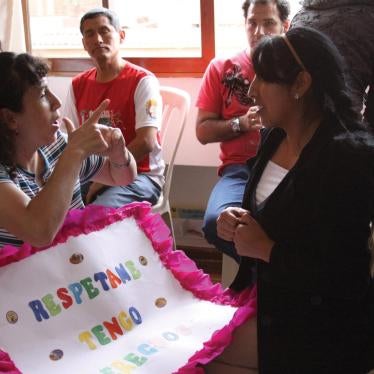Juan Manuel lives in Lima, sharing a house with five friends. They cook, eat, and socialize together. He recently began a new job at a bank. In 2010 and 2011, Juan Manuel voted in municipal and national elections.
None of this should be out of the ordinary. But his story is an exceptional case.
Juan Manuel spent nearly two decades in a government institution, where he rarely could make decisions on his own – not when or what to eat, how to spend his free time, or even what to wear. And he was denied his right to vote.
In our research in Peru, we documented the legacy of a policy, changed only last October, that arbitrarily denied thousands of people with intellectual and psychosocial disabilities labeled “mentally disabled” their right to vote. They face barriers to getting identity documents essential for voting, and lack support mechanisms to help make voting decisions.
Things are starting to change. This June, Congress passed a new disability rights law to update its national laws to conform to the Convention on the Rights of Persons with Disabilities – which Peru ratified in 2008, one of the first countries to do so. And it’s worth noting that this started as a citizens’ initiative, led by organizations of people with disabilities.
The new law makes clear that people with disabilities can act in their own interest, and when necessary, should be supported to exercise their rights. It also includes a groundbreaking provision on the right of people with disabilities to live independently in the community.
But for many Peruvians with intellectual or psychosocial disabilities, these rights are not yet realized.
Juan Manuel and his friends had the support of HANOPREM, a nongovernmental group that works with people with intellectual disabilities to learn to live independently, and with dignity, in the community.
But many people lack such opportunities. Under Peru’s system of interdiction, the civil code allows a judge to declare a person with certain intellectual or mental disabilities incompetent and to impose a guardian.
This suspends the person’s civil rights and creates obstacles in almost all aspects of life: voting, opening a bank account, getting a job, owning or inheriting property, getting married, or signing official documents on behalf of their children, irrespective of whether the person can manage these matters alone or with assistance.
The Executive should promptly promulgate the new disability rights law to guarantee compliance with the Disability Rights Convention. Then, as the new law requires, it should work with people with disabilities to develop a plan for supported decision-making. Peru would be a leader on this issue. And Juan Manuel’s story would become the rule, instead of the exception.
Rebecca Schleifer is advocacy director for health and human rights and Shantha Rau Barriga is disability rights researcher and advocate at Human Rights Watch.








